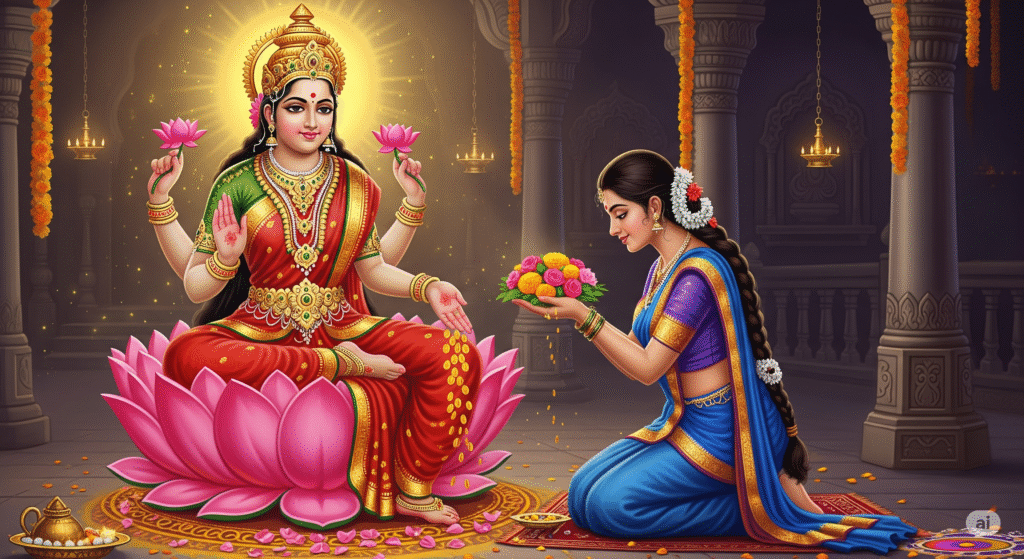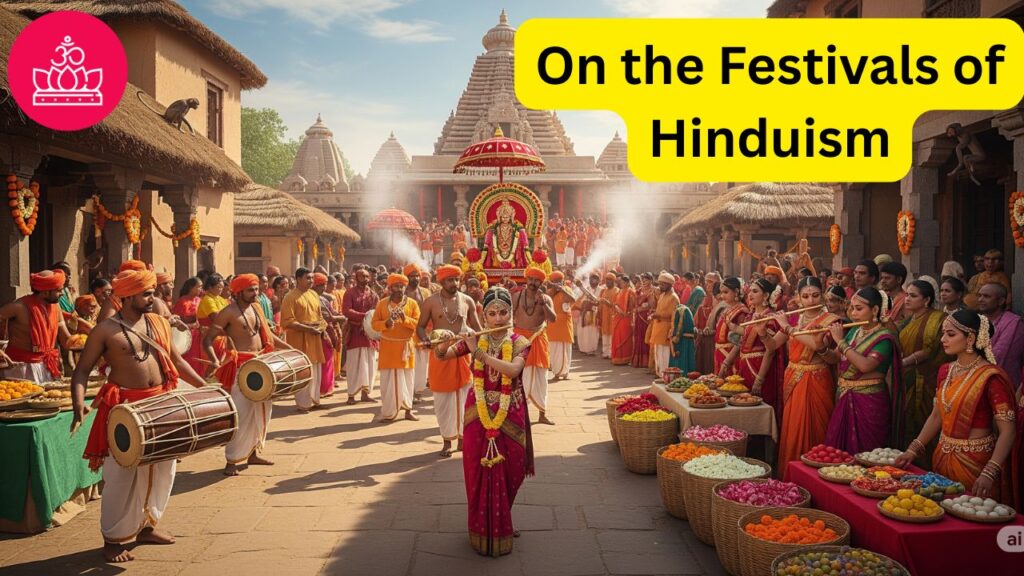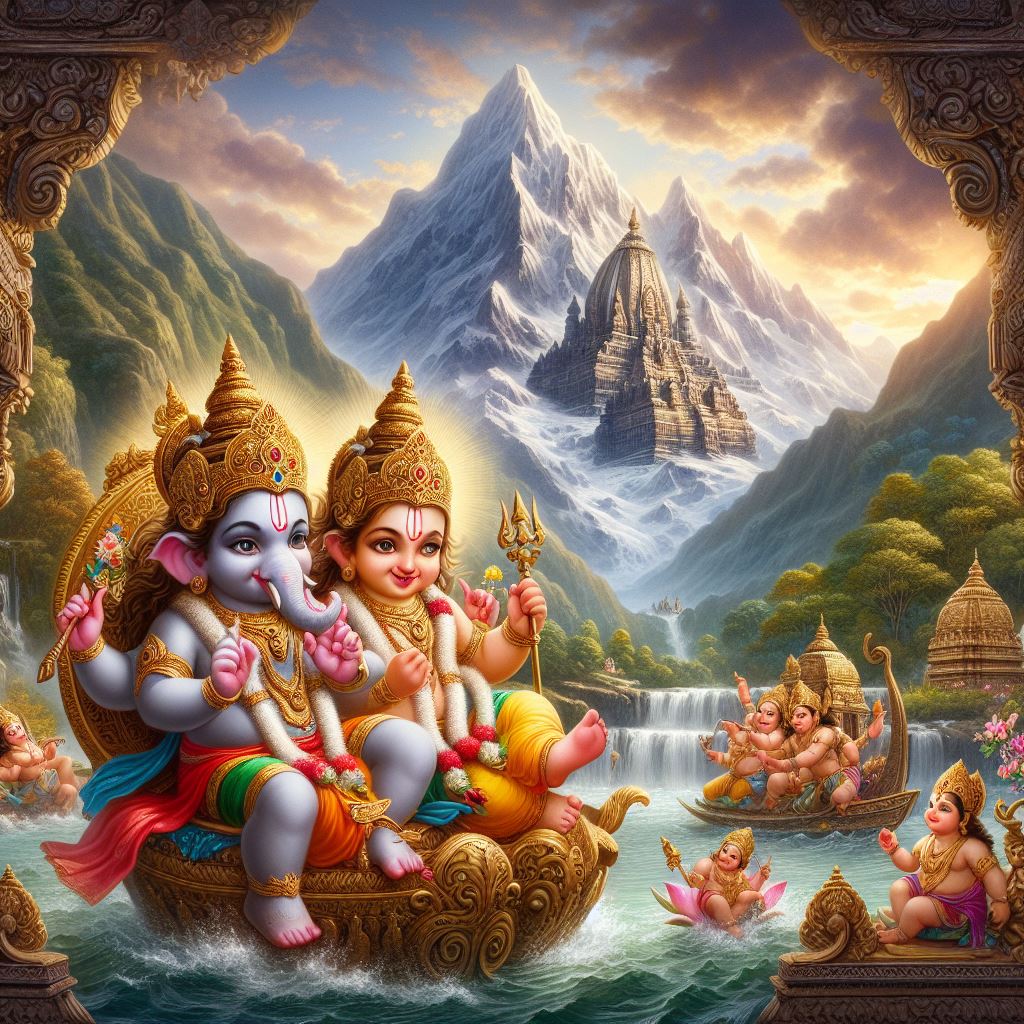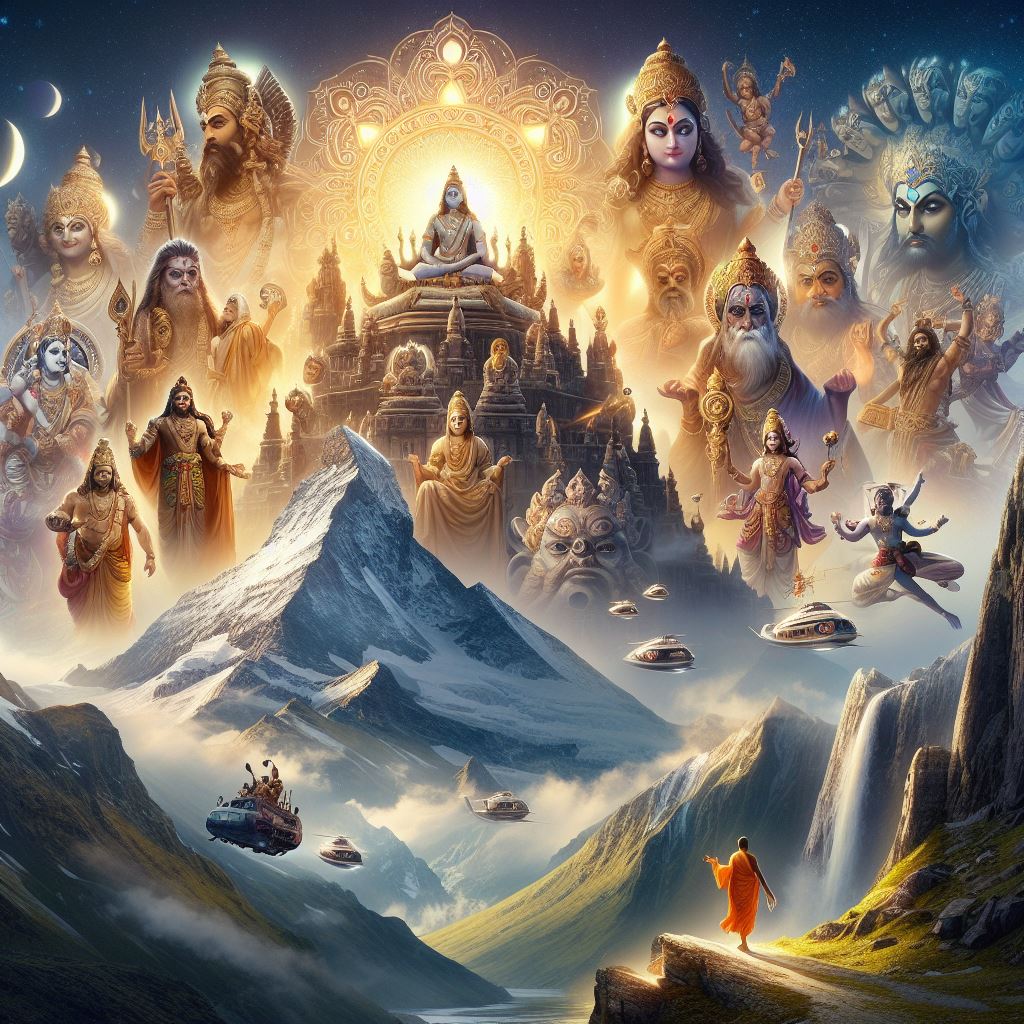On the Festivals of Hinduism with a special focus on Vara Lakshmi Vratam
Our country ‘Bharata’ and our ‘Sanatana Dharma’ are vast palettes of multitude of colors. There are dozens of languages, numerous traditions and yet there is always a thread of unity that passes through all these beads of diversity! And that is the beauty of our country and religion!
We have three terms – ‘parva’, ‘vratam’, and ‘vidhi’. The ‘parva’ means ‘festival’ and ‘vrata’ means ‘vow’ which is the part of the ‘vidhi (procedure)’ to perform that festival. Every ‘parva’ is celebrated with an associated ‘vratam’ as per the ‘Puja-vidhanam’ associated with that deity or festival.
In Hinduism, it is not at all an exaggeration if I say – “Every day is a ‘parva (festival)’ day!” Now, let’s first understand what a ‘festival day’ means! Any day or time which is a moment for celebration of the divinity, where we rejoice by connecting with the divinity through rituals, offerings, performances, and feel blessed – is a festival. The underlying bedrock is ‘devotion’ which converts an observance, or a performance or a celebration into a ‘festival’! Otherwise, all other celebrations sans devotion are mere formalities of which – Teachers Day, Children’s Day and Gandhi Jayanti are few examples.
For Hindus – In one or the other way, be it on a smaller scale or larger, inevitably, every day is a sacred festive day, and there is a procedure to perform worship on that day. For instance –
- All the days of a week have their respective ruling planetary deities in the form of ‘graha devata-s’ and those graha-s have their presiding overlords as well. For example, the deity of Tuesday is ‘Mars (Mangala)’ hence Tuesday is termed ‘Mangala-vara’, and the God who is the presiding deity of this ruling Graha (mangala) is ‘Kartikeya’. Hence, a Hindu who faithfully worships ‘Managala’ as a Graha-devata, or is a devoted worshiper of Lord Skanda, he receives the grace of Skanda directly or indirectly in both the ways.
- Every ‘tithi (date)’ is a divine goddess and all the 15 tithi-s have their corresponding fifteen goddesses who preside over these ‘tithi-s’. These goddesses are termed ‘nitya-s (eternals)’ and in the tradition there is a procedure of ‘Aradhana’ of ‘tithi-nitya devata-s’. Therefore, for those who are initiated into worshipping these goddesses, every date is a sacred date.
- Likewise, twilights are the sacred goddesses of dawn, midday and dusk during which the twice-born offer their prayers to the Supreme Being.
Besides all these, there are hundreds of ‘vrata-s (austerities)’ observed on special dates in Hindu tradition. Many of these ‘vrata-s’ are prescribed in our Hindu sacred scriptures and some of them have their origin in local customs and traditions also.
In Hinduism, the God supreme doesn’t sit in some highest realm remaining inaccessible to the devotees on the ground until death. Our God (or Goddess) pervades everything right from the universe to the smallest village. In this connection the ‘Devi Bhagavatam’ says that the Supreme Goddess manifests herself in various forms right from the superior aspects of Goddesses as complete manifestations to the very partial manifestations in the level of a village as ‘grama-devata-s (village goddesses)’. Every first is presided over by the ‘forest deity (Goddess Vana-Durga)’, every lineage is presided over by a ‘kula-devi’ or a ‘kula-devata’!
“कला या याः समुद्भूता पूजितास्ताश्च भारते ॥ 157b
पूजिता ग्रामदेव्यश्च ग्रामे च नगरे मुने ।” (Devi Bhagavatam 9:01:157b-158a)
“Besides these, all the other Devîs that have issued from Prakriti Devî are all worshipped. So much so that in the villages, the village Deities, and in the cities, the city Deities are worshipped”.
Our God interacts with the ground level humans day in and day out. To some devotee in the form of a friend in need, to another in the form of a needy, to someone else in the form of an animal, and to others even may show up in dreams. By all these various means our Gods always guide us everyday. Not all interactions are recorded in the ‘Maha Purana-s’, but the Gods imparting instructions, guiding the devotee, getting things done and finally blessing the devotee with fruition– all of these keep happening in every era, every decade. Thereby, the local legends get formed and devotees who have gained the direct evidence of the experience of the God, celebrate their experience by honoring that date as a festival on which they had gained the grace of that God. Such a trend sets local legends into motion, and observances of worship, as per those legends, becomes a local tradition!
Therefore, Hindu festivals are diverse, their origins range from sacred scriptures to direct experiences forming local traditions.And it is totally incorrect to dismiss local traditions as inauthentic. Who are we to cancel someone’s long held devotional feelings and long upheld traditions? The very Gods wouldn’t approve of such cancellations of which we have an example as a case study – Legend says that once Shri Ramanujacharya, the propagator of the Visishtadvaita school, had visited Puri in Odisha, the land of Lord Jagannatha! He intended to change the procedure of worship that the locals used to follow and establish the Shri Vaishnava mode of worship instead. Lord Jagannatha himself angrily banished him from entering the sacred land of Puri. Did the lord really get upset with him who was a devotee of himself? Not really, because the very Jagannatha as Narayana and Srinivasa accepted Ramanuja’s method of worship in other temples. But there in Puri, the lord accepted the methods of worship which the pure-hearted devotees of that land used to follow as per their tradition.
God respects not only the rules of the scriptures, but also the norms of the local traditions. This sentiment is even seen in the words of Lord Rama in ‘Valmiki Ramayana (2:103:30)’, when he says, ““यदन्नः पुरुषो भवति तदन्ना स्तस्य देवताः”, meaning, “That which man consumes as food, is also consumed by the Gods (when offered)”. A similar quote exists elsewhere which says, “यदन्नः वै मानवाः तदन्न वै देवाः। यद् भाषा वै मानवाः तद्भाषा वै देवाः॥”, meaning, “Whatever the humans eat, the Gods eat that too, and whatever the humans speak Gods speak the same”. Therefore, it is a futile exercise to categorize only those traditions as authentic which arise directly from scriptures and dismiss the local traditions as inauthentic.Therefore, howsoever educated we become, in the name of modernization, should not let the family customs, village traditions, and regional festivals to die.
The number of ‘parva-s’ and ‘vrata-s’ in our religion thus being in hundreds, the ‘vrata-s’ primarily originating from sacred scriptures, are performed by all and sundry, whereas the ‘vrata-s’ originating from a regional tradition are celebrated only in those regions. For example – ‘Maha Shivaratri’, ‘Tulasi Puja’, ‘Ganesha Puja’ etc., are observed alike across the country because these are the standard festivals as prescribed in the Purana-s. On the other hand, we can see examples like ‘Teej’ which is performed in North India and South Indians aren’t aware of that. Likewise, ‘Vara Lakshmi Vratam’ is mostly performed in South India and North Indians aren’t aware of this. Names may be different, customs may be different but if we see carefully, through Teej women worship Goddess Parvati, and via ‘Vara Lakshmi Puja’ women worship Goddess Lakshmi – Both divine mother goddesses are worshipped with the identical purpose of longevity of the marital bliss.
In one life, it is not possible to perform all the hundreds of ‘vrata-’s that exist in our books and our traditions. Therefore, some regions have taken some procedures of that endless list and observe them with faith, whereas some other regions have taken some other procedures for their worship. It is essential for us, as Hindus, to respect all the traditions and uphold their practices, so that the multitudes of colors in the color-palette that Hinduism is, stay vibrant and unfaded!
Vara Lakshmi Vratam

Well, on the ‘Friday’ that falls before the ‘Pournima’ in the month of ‘Shravana’,’Vara Lakshmi Puja’ is celebrated in the South Indian states especially, Andhra Pradesh, Telangana, Karnataka, and Tamil Nadu. Today being that day in the year 2025, let us dwell upon the significance of this ‘Vara Lakshmi Vratam’.
In Samskritam, ‘vara’ means ‘boon’ and hence in the generic meaning it is a worship of the all auspicious mother Goddess Lakshmi who generously confers boons upon the devotees. In fact this is the very theme upon which the ‘vrata-katha (story)’ also dwells. As per the story, there existed a lady named ‘Charumati’ who was a faithful wife and an excellent human being. Pleased by her goodness Goddess Lakshmi appears in her dream and instructs her to perform worship of Lakshmi. Then adhering to the procedure taught by the very Goddess, Charumati completes the ritual worship of the mother Goddess and as soon as her worship gets over, instantly she gains wealth and dazzles in Golden ornaments – all by the boon giving auspicious mother Lakshmi. Hence she is called ‘Vara Lakshmi’.
Now, let’s dig a bit deeper into this story to collect some gems of wisdom secretly weaved in there. In Hindu stories everything has a deeper meaning, even the very name itself carries great teachings. The lady’s name is ‘Charumati’ – In Samskritam ‘charu’ means ‘beautiful’ or ‘good’, and ‘mati’ means ‘mind’. So, the teaching that we get from this story is that – If a devotee (gender neutral) is of a ‘beautiful-mind’ in which righteousness thrives, goodwill resides, and all auspicious qualities exist, then such a devotee of pious mind becomes worthy of gaining the vision of the great Goddess Lakshmi. And such a devotee gets the grace of the mother and all his/her worldly miseries get erased and they lead a blissful life with all creature comforts.
There is another deeper meaning in the very name of the Goddess. Though ‘vara’ as a noun means ‘boon’, as an adjective ‘vara’ means ‘supreme’ or ‘best’. So, ‘Vara Lakshmi’ is that goddess who showers boons upon that devotee who is ‘Vara (the Best)’ in his or her worthiness to qualify for the ‘Best’ outcomes. So, the ‘Best’ man or woman gains the favours of the Best Goddess.
There is yet another lesson to learn from the name ‘Vara Lakshmi’ when looked at as a single term. All this universe is pervaded by the supreme being no doubt, but even in the generics the specifics are more special. There are multitudes of ordinary snakes, but among them Sesha and Vasuki are the supreme. There are many birds, but among them the Garuda is the supreme. There are many luminaries, but the Sungod reigns supreme among them. Out of all the water bodies, Ganga has a special place, out of all the medicinal plans Tulasi is divinely supreme, out of all the places on Earth, Kashi reigns supreme, out of all the elephants Airavata is the best. And the list goes on!…
Everything in this universe that has a special lusture than others of its kind, mother Lakshmi resides. Everything that is supreme among others, that is supreme because of her presence or pervasiveness. For instance – She remains in the cows and bulls among the quadrupeds. She resides in all that is of Satva quality such as White color, white flowers. She remains in them who adhere to righteousness. She exists in all things that are termed wealth. What is wealth? It is not money alone. For a man ailing from sickness health is the wealth, for a childless couple, gaining progeny is the highest wealth, for the women blessed with great beauty, their youthfulness is the wealth. And likewise…! So, whatever excellent thing we cherish and desire there exists Lakshmi. And only when she is graceful upon us, she grants all those objects or objectives that we hold supreme in our hearts. Therefore, for thai reason also, she is the ‘vara lakshmi’ – The Supreme Lakshmi who exists in all things superior and who grants highest boons to us when pleased. And upon whom would she be so extremely pleased and graceful? The answer is those who possess ‘charu-mati’!
May that kindest mother of all of us, be graceful upon us and uplift us in our lives!



